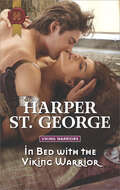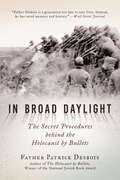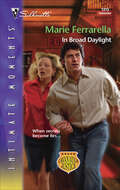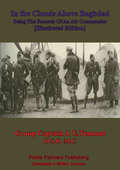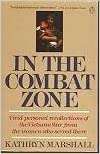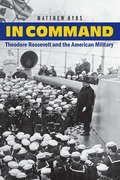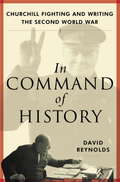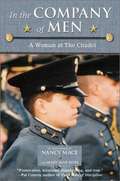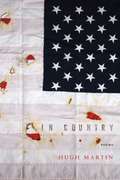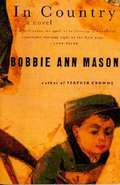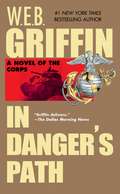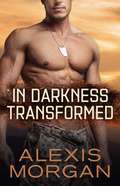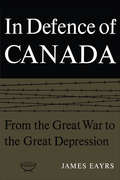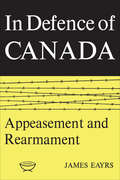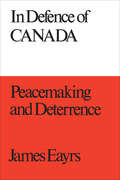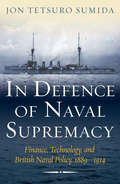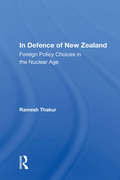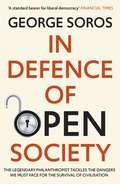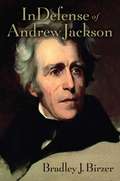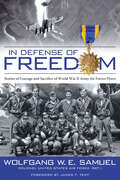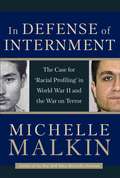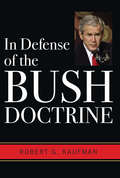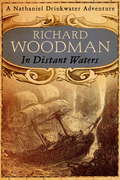- Table View
- List View
In Bed with the Viking Warrior: Baby On The Oregon Trail Compromising The Duke's Daughter In Bed With The Viking Warrior (Viking Warriors #3)
by Harper St. George"I still don't know who I am... What if I'm an enemy?" Injured in battle, Magnus awakens with no memory of who he is. Knowing he is in danger, he flees...only to encounter a Saxon maiden in peril. Aisly hates the Danes who invaded her land and killed her husband. Yet, when a mysterious wounded warrior saves her life, she cannot turn her back on him. As Aisly tends to Magnus's injuries, desire surges between them. But when Magnus's true identity is revealed, she's thrown into turmoil-she has invited her enemy into her bed!
In Broad Daylight: The Secret Procedures behind the Holocaust by Bullets
by Father Patrick DesboisHow the Murder of More Than Two Million Jews Was Carried Out—In Broad DaylightBased on a decade of work by Father Patrick Desbois and his team at Yahad–In Unum that has culminated to date in interviews with more than 5,700 neighbors to the murdered Jews and visits to more than 2,700 extermination sites, many of them unmarked.One key finding: Genocide does not happen without the neighbors. The neighbors are instrumental to the crime.In his National Jewish Book Award–winning book The Holocaust by Bullets, Father Patrick Desbois documented for the first time the murder of 1.5 million Jews in Ukraine during World War II. Nearly a decade of further work by his team, drawing on interviews with neighbors of the Jews, wartime records, and the application of modern forensic practices to long-hidden grave sites. has resulted in stunning new findings about the extent and nature of the genocide.In Broad Daylight documents mass killings in seven countries formerly part of the Soviet Union that were invaded by Nazi Germany. It shows how these murders followed a template, or script, which included a timetable that was duplicated from place to place. Far from being kept secret, the killings were done in broad daylight, before witnesses. Often, they were treated as public spectacle. The Nazis deliberately involved the local inhabitants in the mechanics of death—whether it was to cook for the killers, to dig or cover the graves, to witness their Jewish neighbors being marched off, or to take part in the slaughter. They availed themselves of local people and the structures of Soviet life in order to make the Eastern Holocaust happen.Narrating in lucid, powerful prose that has the immediacy of a crime report, Father Desbois assembles a chilling account of how, concretely, these events took place in village after village, from the selection of the date to the twenty-four-hour period in which the mass murders unfolded. Today, such groups as ISIS put into practice the Nazis’ lessons on making genocide efficient.The book includes an historical introduction by Andrej Umansky, research fellow at the Institute for Criminal Law and Criminal Procedure, University of Cologne, Germany, and historical and legal advisor to Yahad-In Unum.
In Broad Daylight (Cavanaugh Justice #7)
by Marie FerrarellaSHE WAS ALL KINDS OFWRONG FOR A MANTRYING TO DO THERIGHT THINGShe moved like poetry and wore her sensuality likea second skin. Blond, beautiful Brenda York couldmake a good cop cross the line. And when thatcop was Dax Cavanaugh, on the trail of a missingchild, it was an all-out war between duty anddesire. And desire was winning.Thrown together with the detective searching forher kidnapped student, Brenda couldn't ignore thesexual tension simmering between them. But whatwould happen once Dax learned she was carryinganother man's child? Was their love strong enoughto make them forget everything but the need tobe together at any cost?
In The Clouds Above Baghdad, Being The Records Of An Air Commander [Illustrated Edition]
by Group Captain John Edward Tennant D.S.O. M.C."War in the air over the Middle EastMesopotamia, 'the land of the two rivers', is deemed the birthplace of civilisation. Now modern day Iraq, it has known warfare throughout the millennia that man has inhabited it. By the first years of the twentieth century the Ottoman Turkish Empire had claimed Mesopotamia as their own and its alliance with Germany during the Great War brought battle to it once more. For the first time conflict came to its skies in the form of the newly formed air forces of the opposing armies. This book concerns the experiences of an officer of the R. F. C fighting a war far different from his comrades on the Western Front but one which was just as deadly. This is an usual account of early war in the air from one of the great conflicts sideshow theatres."--Leonaur Print EditionAuthor -- Group Captain John Edward Tennant D.S.O. M.C. d. 1941Text taken, whole and complete, from the edition published in London, C. Palmer, 1920.Original Page Count - x and 289 pages.Illustrations -- 38 illustrations.
In The Combat Zone: Vivid Personal Recollections of the Vietnam War from the Women Who Served There
by Kathryn MarshallReveals the experiences of the many women involved in the Vietnam War, among them entertainers, Red Cross aides, nurses, and intelligence decoders.
In Command: Theodore Roosevelt and the American Military
by Matthew OyosAlthough Theodore Roosevelt was not a wartime president, he took his role as commander in chief very seriously. In Command explores Roosevelt’s efforts to modernize the American military before, during, and after his presidency (1901–9). Matthew Oyos examines the evolution of Roosevelt’s ideas about military force in the age of industry and explores his drive to promote new institutions of command: technological innovations, militia reform, and international military missions. Oyos places these developments into broader themes of Progressive Era reform, civil-military tensions, and Roosevelt’s ideas of national cultural vitality and civic duty.In Command focuses on Roosevelt’s career-long commitment to transforming the military institutions of the United States. Roosevelt’s promotion of innovative military technologies, his desire to inject the officer corps with fresh vigor, and his role in building new institutions for command changed the American military landscape. His attempt to modernize the military while struggling with the changing nature of warfare during his time resonates with and provides unique insight into the challenges presented by today’s rapidly changing strategic environment.
In Command of History
by David ReynoldsWinston Churchill was one of the giants of the twentieth century. As Britain's prime minister from 1940 to 1945, he courageously led his nation and the world away from appeasement, into war, and on to triumph over the Axis dictators. His classic six-volume account of those years, The Second World War, has shaped our perceptions of the conflict and secured Churchill's place as its most important chronicler. Now, for the first time, a book explains how Churchill wrote this masterwork, and in the process enhances and often revises our understanding of one of history's most complex, vivid, and eloquent leaders. In Command of History sheds new light on Churchill in his multiple, often overlapping roles as warrior, statesman, politician, and historian. Citing excerpts from the drafts and correspondence for Churchill's magnum opus, David Reynolds opens our eyes to the myriad forces that shaped its final form. We see how Churchill' s manuscripts were vetted by Whitehall to conceal secrets such as the breaking of the Enigma code by British spymasters at Bletchley Park, and how Churchill himself edited the volumes to avoid offending postwar statesmen such as Tito, Charles de Gaulle, and Dwight D. Eisenhower. We explore his confusions about the true story of the atomic bomb, learn of his second thoughts about Stalin, and watch him repackage himself as a consistent advocate of the D-Day landings. In Command of History is a major work that forces us to reconsider much received wisdom about World War II. It also peels back the covers from an unjustly neglected period of Churchill's life, his "second wilderness" years, 1945--1951. During this time Churchill, now over seventy, wrote himself into history, politicked himself back into 10 Downing Street, and delivered some of the most vital oratory of his career, including his pivotal "iron curtain" speech. Exhaustively researched and dazzlingly written, this is a revelatory portrait of one of the world's most profiled figures, a work by a historian in full command of his craft. "A fascinating account that accomplishes the impossible: [Reynolds] actually finds something new and interesting to say about one of the most chronicled characters of all time." -The New York Times Book Review A New York Times NOTABLE BOOK OF THE YEAR A BEST HISTORY OF THE YEAR SELECTION -The New York SunNOTE: This edition does not include photographs.
In The Company Of Men: A Woman At The Citadel
by Nancy Mace Mary Jane Ross"Leaning forward until I could feel his breath on the back of my neck he began to rack me in an insidious, threatening manner. 'We all hate you. When are you going to leave? We hate you, do you hear me?'...On and on the voice went, and for the first time since I had come to the school, I was afraid, afraid and disgusted."<P> When Nancy Mace entered The Citadel, the United States government had just recently overturned the ruling that women were not allowed to enter the "Core of Cadets." Having grown up in a military family, Nancy was not unfamiliar with the harsh realities of military life. Her father, a brigadier general, had graduated from The Citadel and her older sister was a military graduate, but it would be Nancy's journey alone. And as many a knob has found out, life inside the dazzling white ramparts of this famous fortress is far from pleasant. Upon entering those grand gates, Nancy Mace soon found out that she wasn't just fighting the tradition of the corps, but the culture and city that surrounded it. Steeped in tradition and lore, the grand bastion known as El Cid is considered one of the South's most infamous and controversial institutions. Built in 1842, it has turned out a unique brand of Southern man -- and now woman. This is the true first-person account of a young woman's battle to be a part of the long gray line.
In Country (American Poets Continuum #169)
by Hugh MartinHugh Martin’s second full-length poetry collection moves within and among history to broaden and complicate our understanding of war. These poems push beyond tidy generalizations and easy moralizing as they explore the complex, often tense relationships between U.S. soldiers and Iraqi civilians. The speaker journeys through training to deployment and back again, returning home to reflect on the soldiers and civilians—both memories and ghosts—left behind. Filled with recollected dialogue and true-to-life encounters, these poems question, deconstruct, examine, and reintegrate the myths and realities of service.
In Country
by Bobbie Ann MasonIn the summer of 1984, the war in Vietnam comes home to Sam Hughes, whose father was killed there before she was born. Granddad had said they were embarrassed that they lost the war, but Emmett said they were embarrassed that they were still alive.
In Danger's Path (Corps #8)
by W.E.B. GriffinPut in charge of the OSS's Pacific operations, General Fleming Pickering is faced with two covert missions in the Gobi Desert. Called to duty is a Marine he doesn't expect...a scapegrace pilot named Malcolm, his son. Together, they will venture incognito--and with luck they may even come out alive...
In Darkness Transformed (The Paladin Strike Team #1)
by Alexis MorganThe USA TODAY bestselling author of the Paladin series returns with this sexy, original title featuring a man discovering the paranormal world of the paladins.Dying hurts…but not as much as living. Eli is lucky to survive the helicopter crash that killed the rest of the passengers. But when he notices his wounds healing before his eyes, it seems like his survival may have come from more than luck. Safara knows what Eli does not—Eli is a paladin, a mortal enemy of someone like Safara, someone from Kalithia. Still, after Eli saves Safara’s life, and Safara introduces Eli to a whole new world, they just can’t seem to treat each as enemies.
In Defence of Canada Volume I: From the Great War to the Great Depression
by James EayrsThe years from 1919 to 1935 were not years in which defence was of pressing importance to the majority of Canadian politicians, yet this does not mean that the history of Ottawa's defence policies in this period of 'the fire-proof house' is dull or trivial. Professor Eayrs has had access to most of the documents, files, and diaries of these years, and from them has evolved a fascinating and well-written account of the attitudes and thoughts - and personalities - dominant at this time. Included in this survey are the story of the expedition to Siberia, the first account of the birth of the Royal Canadian Air Force, the defensive campaign waged by Walter Hose for the survival of the Canadian Navy, the founding of General McNaughton's 'Royal Twenty-Centers,' and many other aspects of the military history of Canada in those years. Seen from the present day some episodes have, it must be admitted, a wry folly to them. The central thesis or moral that emerges from the work is that military and diplomatic considerations ought to be indissolubly combined in study and analysis as well as in formulation and execution.
In Defence of Canada Volume II: Appeasement and Rearmament
by James EayrsIn Defence of Canada: Appeasement and Rearmament is a companion and sequel to Eayrs' In Defence of Canada: From the Great War to the Great Depression (Toronto 1964). Like Volume I, Volume II rejects as outmoded and misleading the traditional division of national security policy into two compartments, one called foreign policy, the other, defence policy. Like Volume I, Volume II is meant to demonstrate that the military and diplomatic components of national security policy are, and ought to be, indissolubly combined, in study and analysis, as well as in formulation and execution. The emphasis in Volume II is mainly on the diplomatic: the tempo and importance of Canadian diplomacy steadily increase during the period with which it is concerned. That period opens with the Italian war aggression against Ethiopia in 1935. It closes in the late summer and early fall of 1940, as the twilight war becomes a total war.
In Defence of Canada Volume III: Peacemaking and Deterrence
by James EayrsThe first two volumes of this outstanding history of Canada's defence and foreign policy have drawn unanimous acclaim from scholars and critics alike. Richard Preston said of the first volume that is 'opens up a new chapter in Canadian historiography' and of the second that is 'amply lives up to the promise of the earlier epoch-making book.' Kenneth McNaught stated: 'There could not be more important reading for anyone trying to apprehend the tenacious traditions underlying our present position in world affairs.' The third volume has been described in Political Science Quarterly as 'a first class book – learned in content, lucid and witty in style.'
In Defence of Naval Supremacy
by John Tetsuro SumidaSumida presents a provocative and authoritative revisionist history of the origins, nature and consequences of the "Dreadnought Revolution" of 1906. Based on intensive and extensive archival research, the book strives to explain vital financial and technical matters which enable readers to observe the complex interplay of fiscal, technical, strategic, and personal factors that shaped the course of British naval decision-making during the critical quarter century that preceded the outbreak of the First World War.
In Defence Of New Zealand: Foreign Policy Choices In The Nuclear Age
by Ramesh ThakurNuclear-free zones, neutrality, and nonalignment are catchwords that recently have earned unprecedented international publicity for New Zealand's foreign policy. That country's defence policy has also been subjected to its most searching scrutiny since World War II. In this book, Dr. Ramesh Thakur addresses in depth the issues underlying worldwide
In Defence of Open Society: The Legendary Philanthropist Tackles the Dangers We Must Face for the Survival of Civilisation
by George SorosGeorge Soros is among the world's most prominent public figures. He is one of the history's most successful investors and his philanthropy, led by the Open Society Foundations, has donated over $14 billion to promote democracy and human rights in more than 120 countries. But in recent years, Soros has become the focus of sustained right-wing attacks in the United States and around the world based on his commitment to open society, progressive politics and his Jewish background. In this brilliant and spirited book, Soros offers a compendium of his philosophy, a clarion call-to-arms for the ideals of an open society: freedom, democracy, rule of law, human rights, social justice, and social responsibility as a universal idea. In this age of nationalism, populism, anti-Semitism, and the spread of authoritarian governments, Soros's mission to support open societies is as urgent as it is important.
In Defense of Andrew Jackson
by Bradley Birzer“I’m not an Andrew Jackson fan, but I’m definitely a Bradley Birzer fan. His case for Old Hickory is as strong as any I’ve seen and deserves to be reckoned with.”- THOMAS E. WOODS JR., author of The Politically Incorrect Guide to American History. “Most discussion of Andrew Jackson falls into predictable ruts, defaulting automatically to clichés that reflect more on our own time than his. Whether America is entering another ‘Jacksonian’ period depends upon understanding the first one more clearly, and we have Bradley Birzer to thank for taking up a spirited defense of this complicated man and his legacy.” - STEVEN F. HAYWARD, author of The Age of Reagan: The Conservative Counterrevolution 1980-1989. “Liberal revisionists have pounded Andrew Jackson down to the point where Democrats are ashamed to admit he founded their party. In Defense of Andrew Jackson sets the record straight on America’s first populist president.” - JAMES S. ROBBINS, author of Erasing America: Losing Our Future by Destroying Our Past. “As a man and a military hero, Andrew Jackson is as American as they come. But in this timely biography, Bradley Birzer has managed to peel back layers of cliché and reveal our seventh president as a more complex human being than current textbooks allow.” - GLEAVES WHITNEY, director of Grand Valley State University’s Hauenstein Center for Presidential Studies. "He was a man of the frontier, self-made but appreciative of those who gave him their loyalty and support. He was, pure and simple, and American..." He was controversial in his time—and even more controversial in our own. Indian fighter, ardent patriot, hero of the War of 1812, the very embodiment of America’s democratic and frontier spirit, Andrew Jackson was an iconic figure. Today, Jackson is criticized and reviled – condemned as a slave-owner, repudiated as the president who dispatched the Indians down the “Trail of Tears,” dropped with embarrassment by the Democratic Party, and demanded by many to be removed from the twenty-dollar bill. Who is the real Andrew Jackson? The beloved Old Hickory whom Americans once revered? Or the villain who has become a prime target of the Social Justice Warriors? Using letters, diaries, newspaper columns, and notes, historian Bradley Birzer provides a fresh and enlightening perspective on Jackson —unvarnished, true to history, revealing why President Donald Trump sees Andrew Jackson as a political role model, and illustrating the strong parallels between the anxieties of Jacksonian America and the anxieties of the "Hillbilly Elegy" voting bloc of today. In this brilliant new book, Bradley Birzer makes the case that Jackson was… The epitome of the American frontier republican. Passionately devoted to individual liberty. A staunch proponent of Christian morality. Not only dedicated but also vital to the preservation of the Union. A significant and influential role model to President Donald J. Trump. In Defense of Andrew Jackson sets the record straight on our seventh president, revealing a radically new but historically accurate perspective on Jackson.
In Defense of Freedom: Stories of Courage and Sacrifice of World War II Army Air Forces Flyers
by Colonel Wolfgang W. SamuelThe twenty-seven stories in this book serve as a graphic reminder of the selfless heroism of America's World War II Army Air Forces flyers and how necessary they were to achieve Allied victory. Wolfgang Samuel and the pilots he interviewed reveal the peril these men faced to achieve a daunting task, impossible without their bravery. And their sacrifices were stunning—American bomber crews suffered the highest casualties (KIA, MIA, POW, wounded) of all American armed services in World War II. The stories preserved in this book bear that grave danger out. A member of a heavy bomber crew in the 8th Air Force in the period from mid-1942 to spring 1944 was less likely to survive than a US Marine fighting on Iwo Jima or Okinawa. The stories in this unique book are about men who went face to face with their adversaries, who saw their buddies die, who crashed planes, and who became prisoners of war. Many later went on to become the backbone of the postwar Air Force, serving in Korea and Vietnam and during the Cold War. Young Ken Chilstrom led a flight of eight A-36 fighter bombers on a low-level foray in Italy. Only he and two others came home. Bob Hoover thought he could take on the entire German air force, but on his first mission he was shot down, nearly perished, and suffered the remainder of the war in a prisoner-of-war camp. Wolfgang Samuel's new book is all about men like Ken, Bob, and the many friends they lost, who saw World War II through to the end and gave freedom to so many others.
In Defense of Internment: The Case for 'Racial Profiling' in World War II and the War on Terror
by Michelle MalkinIn Defense of Internment
In Defense of Japan: From the Market to the Military in Space Policy
by Saadia M. Pekkanen Paul Kallender-UmezuIn Defense of Japan provides the first complete, up-to-date, English-language account of the history, politics, and policy of Japan's strategic space development. The dual-use nature of space technologies, meaning that they cut across both market and military applications, has had two important consequences for Japan. First, Japan has developed space technologies for the market in its civilian space program that have yet to be commercially competitive. Second, faced with rising geopolitical uncertainties and in the interest of their own economics, the makers of such technologies have been critical players in the shift from the market to the military in Japan's space capabilities and policy. This book shows how the sum total of market-to-military moves across space launch vehicles, satellites and spacecraft, and emerging related technologies, already mark Japan as an advanced military space power.
In Defense of the Bush Doctrine
by Robert G. KaufmanA foreign policy expert “presents a thoughtful, comprehensive case” for the War on Terror—a “historically powerful support of Mr. Bush and his doctrine” (Washington Times).The terrorist attacks of September 11, 2001, shattered the tranquil and prosperous optimism that had blossomed in the United States during the 1990s. President George W. Bush responded with a preemptive Global War on Terror. This controversial strategy led the nation into protracted conflicts in Iraq and Afghanistan and ignited passionate debate about America’s role in the world.In Defense of the Bush Doctrine offers a vigorous argument for the principles of moral democratic realism that inspired the Bush administration's policy. Conservative columnist Robert G. Kaufman argues that the purpose of American foreign policy is to ensure the integrity and vitality of a free society and that America’s grand strategy must be guided by the cardinal virtue of prudence.Kaufman provides a broad historical context for America’s post-9/11 foreign policy, connecting the Bush Doctrine and other issues, such as how the United States should deal with China, to the deeper tradition of American diplomacy. Drawing from positive lessons as well as cautionary tales from the past, Kaufman concludes that moral democratic realism offers the most prudent framework for expanding the democratic zone of peace and minimizing threats to the United States.
In Distant Fields: a wonderful novel of friendship set in WW1 from bestselling author Charlotte Bingham
by Charlotte BinghamIn Distant Fields, by million copy and Sunday Times bestselling author Charlotte Bingham, is a wonderfully heart-wrenching and heart-warming novel of love, heartbreak and, most importantly of all, the remarkable nature of female friendship. Fans of Louise Douglas, Dinah Jefferies and Kristin Hannah will not be disappointed.'An engaging, romantic and nostalgic read' -- Daily Mail'A rip-roaring combination of high romance and breathless excitement' -- Mail on Sunday'As compelling as ever' -- Woman & Home'Just wonderful!' -- ***** Reader review'I found I couldn't put it down... FANTASTIC!!' -- ***** Reader review'There has been a lot written about the Great War, then and now - and this should join the list of must-be-read books. So forget WAR HORSE. This is the one.' -- ***** Reader review*****************************************************************************************ALL ARE EQUAL IN LOVE AND WAR...Christmas 1913: Kitty and Lady Partita are best friends despite vastly different backgrounds. Partita has invited her friend, Kitty, to stay at her ancestral home, Borders Castle.The grandeur of Partita's family seat is in stark contrast to Kitty's home in London where she and her mother, Violet, struggle to maintain appearances despite Kitty's father gambling away the family money.Kitty is introduced to the aristocracy - a fascinating, decorative and theatrical world - and is enthralled, desperately wanting to be part of this way of life.But war breaks out, not only irrevocably changing society, but also the lives of these two beautiful young women. The headstrong Partita and down-to-earth Kitty become nurses and selflessly care for the men horrifically injured in the trenches of WWI.Will world events put a strain on their friendship, or will the strength of their bond shine through?
In Distant Waters: Number 8 in series (Nathaniel Drinkwater #8)
by Richard WoodmanFrom the tide-torn waters of the Thames, where Captain Nathaniel Drinkwater is compelled to deal with a deserter, to the seas off stunning, traitorous Cape Horn - storm-scoured gateway to the Pacific - the great cruiser Patrician is tense with the threat of mutiny. Despite this, Drinkwater captures a Spanish frigate and meets the stunning Doña Ana Maria, daughter of the Commandante of San Francisco. But, having disturbed a hornet's nest of colonial intrigue, Drinkwater finds that the Spanish are eager to humiliate him and the Royal Navy. Moreover, a Russian battleship lurks somewhere offshore, pursuing Tsar Alexander's dark plans. Caught between two formidable enemies, Drinkwater must defeat enemies on all fronts if he is to survive - including on his own ship.
